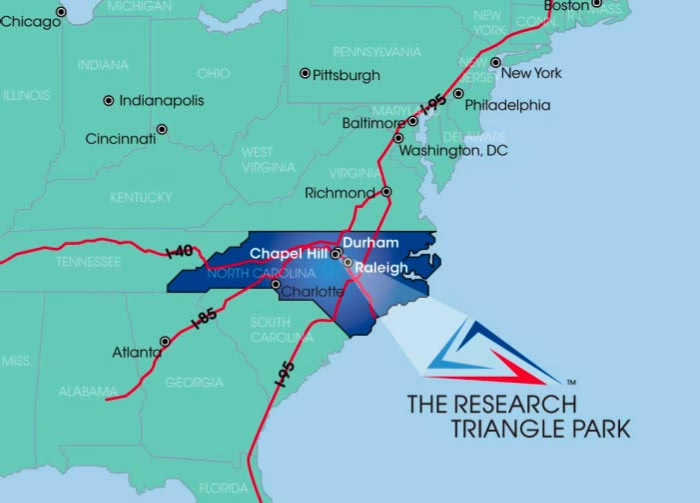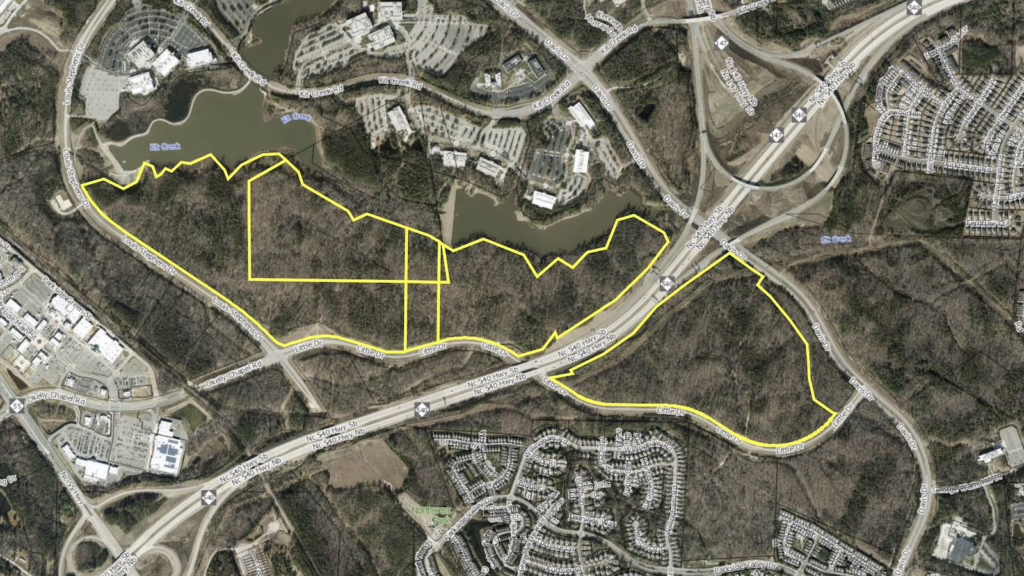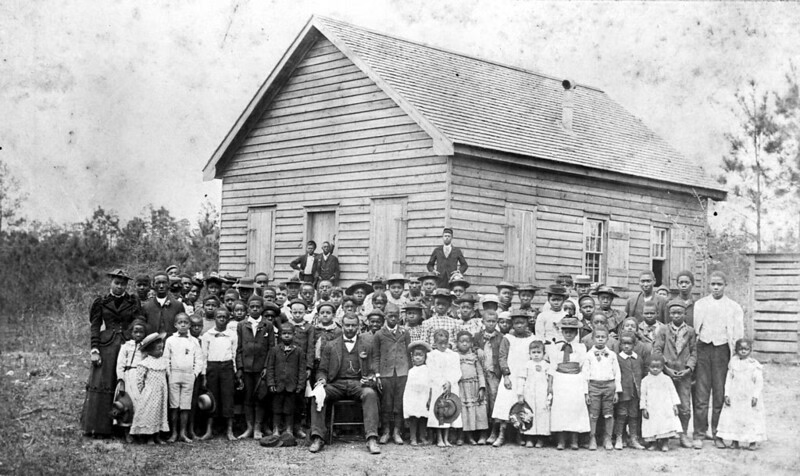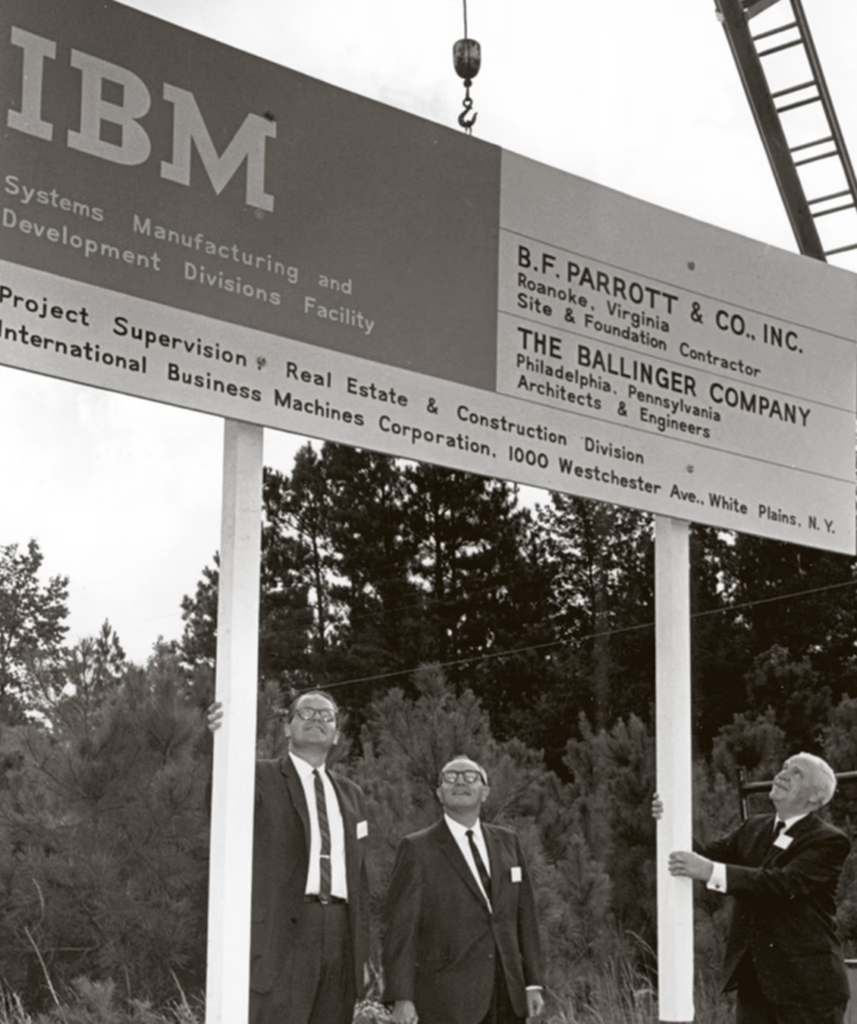For decades, there’s been a very cozy relationship between state and local governments and Big Tech across the country.
When it comes to tech giants relocating, monetary incentives, such as tax breaks or grants, are commonplace – and seemingly expected. To secure the mere possibility of job and economic growth, many cities have consistently and voluntarily degraded themselves.
One place employing this approach is Research Triangle Park (RTP) in North Carolina.
Named after the three geographic locations of the region’s universities – University of North Carolina, Duke University, and North Carolina State University – the Park aims to “promote university research facilities and foster cooperation between institutions.”
“A lot of times, these technology parks are an intention to try to artificially bring together those factors,” explains John Mozena, the president of the Center for Economic Accountability (CEA). “That’s one of the things that made Silicon Valley and other places like it so successful.”
In its own right, RTP has become a smaller version of Silicon Valley.
It has been referred to as the “South’s most successful high-technology venture” and one of “the smartest place on earth.” The Triangle, specifically Raleigh, is one of the fastest-growing tech ecosystems in the world. With a steady flow of a well-educated workforce, RTP has been named a top business-friendly environment time and time again. The city was determined to have the fourth-fastest growing venture capital (VC) ecosystem worldwide.

All of these reasons are why North Carolina ended up on Apple’s radar. But with so much to offer, the Park’s next move perplexed many.
In 2021, an agreement was reached between North Carolina and Apple, which awarded the tech company a $845.8 million subsidy deal. The current plan involves Apple investing $1 billion in North Carolina over 10 years.
This includes a $552 million investment to establish a campus in the Triangle, which must create a minimum of 3,000 jobs. It will spend the remaining funds on expanding its data center in Catawba County.

Some did not see this as a win for North Carolina. The agreement was named the worst deal of 2021 by CEA.
In the report, researchers specifically highlighted how the 39-year agreement would accumulate $21 million in annual lost tax revenue. At the time, this was more than the state spent on workforce-building programs like community college or distance education.
“I can see how Apple might be stretching them over the boards to try to get as much out of them as they can,” explains Dr. Alex Safe Cummings, professor of history at Georgia State University and author of Brain Magnet: Research Triangle Park and the Idea of the Idea Economy. “Having an Apple headquarters in [RTP] would bring a lot of income and tax revenue. So I can see why they would want to do it.”
But, Dr. Cummings says, there seems to be something darker just below the surface.
The Amazon HQ2 Mirage
In 2017, Amazon offered what seemed to be a golden opportunity when it announced a contest between states and cities to be the location for its second headquarters (HQ2).
More than 230 cities submitted bids with the promise of 50,000 white-collar jobs if they won. It appeared to be a promising potential partnership that would grow their economy and benefit residents.
Instead, Amazon created a “reality-TV-style locational rat race”.
Atlanta offered the tech giant its own train cars on the city’s rail system for package delivery. To appeal to Star Trek fan and Amazon CEO, Jeff Bezos, Chicago hired William Shatner, who played Captain Jim Kirk in the series, to narrate their proposal video. And New Rochelle in New York proposed offering the company its own island, which would be renamed Amazon Island.
When all was said and done, Arlington, Virginia and New York City walked away the winners, which many argued were the “obvious” choices from the beginning.
“There was all sorts of silliness and everything,” Mozen says. “At the end of the day, we saw how little of that stuff mattered.”
“Major corporations and elected officials are getting together behind closed doors; and millions, or even billions, of dollars are changing hands. But they’re doing that for the benefit of the rest of us?”
IBM Effect: From Backwoods to Tech Hub
Some have compared Apple’s decision to move to RTP to IBM’s arrival in 1965. Once IBM was established, it helped convert the area into a massive tech hub.
“Just as we saw IBM transform a region, we will see the same kind of benefit from this decision by Apple,” State Sen. Dan Blue said in an interview. “It’s not just Apple that we celebrate coming here today, but it is the ecosystem that it brings with it.”
But unlike Apple, IBM arrived when North Carolina was basically a hopeless, broken state.
By the mid-1950s, the state had the lowest per capita income in the country. Its overreliance on manufacturing led to an extreme lack of economic opportunities and brain drain.
“The history of North Carolina, and most of the South, has been begging for Northern capital to come down and invest,” Dr. Cummings explains. “Basically since after the Civil War.”
But the state did itself no favors. These economic hardships were exacerbated by white supremacy throughout much of the 20th century.

In a bid to disenfranchise newly freed slaves, Democrats instituted policies to severely limit government spending and services starting in 1872. Overtime, the legislation directly contributed to the collapse of North Carolina’s educational and health systems, and would send ripple effects throughout the 20th century.
Despite all the hurdles, the RTP founders were slowly able to establish a foundation for the Park.
It paid off when the first major company, Chemstrand, arrived in 1960. And, five years later, IBM followed.
Biotech: North Carolina’s Savoir
Before IBM, the state spent decades heavily investing in the life sciences industry. And over the coming decades, biotech would prove to be a crucial component to North Carolina’s resilience.
From 2007 to 2009, the U.S. was in a complete economic freefall. When the Great Recession hit, coupled with the U.S. housing bubble bursting, it seemed as if the whole country was left in utter turmoil.
But in North Carolina, the life sciences sector was generating $73 billion in economic activity for the state. Between 2000 and 2012, the industry saw employment increase by 30.9% and provided an average salary of $81,000 a year.
But RTP’s true strength was tested with COVID-19 – and it thrived. During the pandemic, while other states struggled, North Carolina’s tech workforce grew nearly 5%, which gave it the fifth-highest growth rate in the U.S.
Today, the Research Triangle is referred to as a “looming threat” to Greater Boston’s biotech dominance. The Triangle is now “synonymous with pharmaceutical and biotechnology excellence.”And Jones Lang LaSalle has recognized Raleigh-Durham as the No. 1 biomanufacturing market in the U.S.

Recently, RTP even caught the attention of one of the hottest pharmaceutical companies in the world, Novo Nordisk, the Danish company behind the weight-loss drug Ozempic.
There’s so much that can be said about the positive impact of biotech. It made the state what it is today.
So the question remains: Is Apple capable of having the same impact as IBM?
Where You at Apple?
Before Apple and Park leaders can measure the success of their plan, the tech giant needs to show up first.
In December of 2023, ABC11 obtained documents suggesting construction wouldn’t start until 2026. In May of 2024, the whole project appeared to be in a “holding pattern.”
The start date was pushed into even further uncertainty in June when The News & Observer reported that Apple was asking the state Department of Commerce to suspend the project for another four years.
In a statement, Apple said it was still “looking forward to developing our new campus in the coming years,” adding that it had so far created 600 positions in the Raleigh area.
But while Apple can’t seem to commit to a timeline, North Carolina has been preparing for their arrival.
Wake County, as well as Duke Energy, says they’re ready to get the project off the ground and are waiting on the tech giant to move forward.
Wake County officials finished conducting their review for Apple’s stormwater permit in early 2024, but never received any updates from Apple, preventing them from moving forward with the approval process.
Additionally, Duke Energy finished installing main power lines to the area and is currently waiting on development to connect everything.
“For your entire local economy [to depend on multinational corporations] it can potentially be dangerous, because they might just pull up stakes and leave all of a sudden,” Dr. Cummings explains.
“So the obvious question is, well, why do they keep doing it?” Mozena asks. “The Federal Reserve can’t predict what the amount of unemployment rates is going to be next month — much less how many jobs one company is going to have in a decade.”
Research shows these deals can do more harm than good for local communities. But they do seem to be beneficial to one group in particular.
“There are just no real-world implications for this stuff,” Mozena adds. “But there is also a lot of evidence that shows there’s a very real, measurable, and significant political advantage.”
These incentive deals have become a way to convince voters that their hometown has the potential to be a major tech hub. By claiming they are creating or fighting for jobs, it becomes a tool for politicians to use to attract a larger voting base.
Even if a politician delivers on their promise, these for-profit empires can still decide to leave or lay off workers, including North Carolina’s biotech savior.
“One of the problems with the modern economic development model is that overwhelmingly, this money goes to big companies,” Mozena says. “One of the most useful and powerful tools there is for being able to predict what a place’s future economy is going to look like is to look at the small business formation rate in the present day.”
RTP Future
There are a few points that need to be addressed in the state, including a historic lack of later-stage funding and angel investors, but the future is bright.
With the growing success of the Park, there has been a flywheel effect. RTP entrepreneurs are successfully exiting their companies and reinvesting that capital back into the ecosystem.
Additionally, small and medium-sized startups have seen surprisingly high investments. For example, since 2014, Raleigh-based product-analytics platform Pendo has raised almost $470 million, according to Crunchbase.
And Pendo is not alone.
“What has changed in RTP, since about 2000, is that there is a local startup economy,” says Dr. Cummings. “If I were whispering in the ear of a local politician in North Carolina, I would say, nurture those local startups and businesses, rather than trying to beg for Apple or Microsoft to come and plant themselves.”
But maybe the biggest lesson to walk away with doesn’t come from the Apple campus or HQ2 results.
“Everybody talks about who won Amazon’s HQ2, but nobody ever really looks at the process of how Seattle won Amazon’s HQ1,” Mozena explains.
Bezos’s final selection came down to his own research, predictions, and assumptions. One of the main drivers behind his decision was the physical proximity to countries like China.
“Even if you are a company that never physically interacts with its customers as Amazon does [–] place matters,” he continues. “Businesses are voting with their feet and with their wallets and with their workforces. And that’s what matters, not the subsidies.


.png)

.png)
.png)